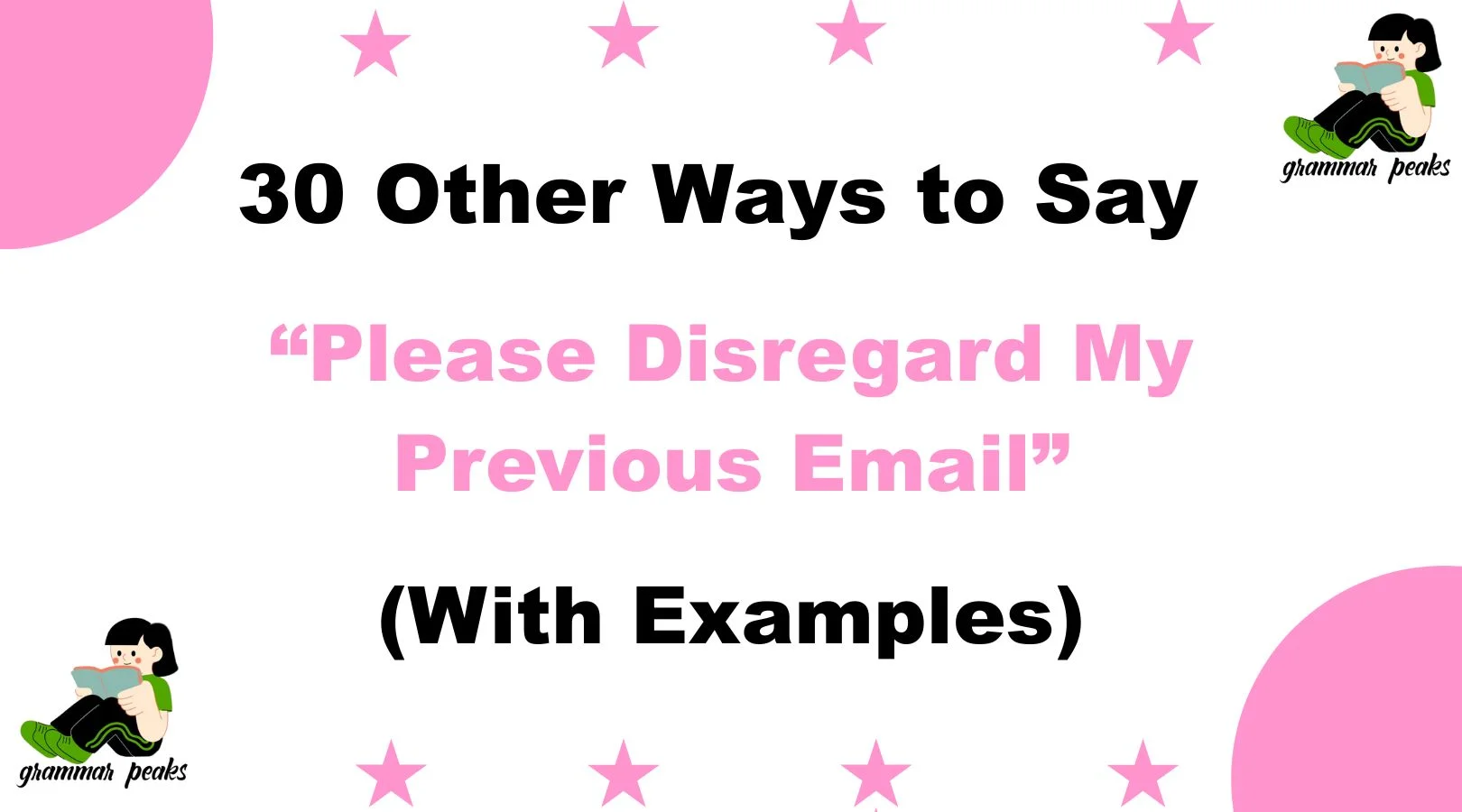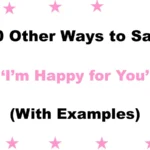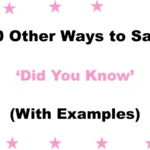Finding the right words to express yourself—especially when correcting or updating information—is truly important. Saying “Please disregard my previous email” can sometimes feel a bit formal or even abrupt. Using warm, thoughtful alternatives can help your message feel more personal and considerate, showing you care about clarity and the recipient’s time.
Whether you’re fixing a mistake, updating details, or simply redirecting attention, these 30 alternatives will help you communicate with empathy and professionalism. Let’s explore meaningful ways to soften your message while keeping it clear and respectful.
What Does “Please Disregard My Previous Email” Mean?
“Please disregard my previous email” is a polite and professional phrase used to ask someone to ignore or not take action on a message you sent earlier. This often happens when you’ve made a mistake, sent the wrong attachment, shared outdated information, or simply hit “send” too soon.
By saying this, you’re letting the recipient know that your earlier message is no longer valid, and they should wait for a corrected or updated version.
When to Use “Please Disregard My Previous Email”
- When correcting a mistake in your earlier message
- When updating or changing information that was already shared
- When you accidentally sent incomplete or wrong details
- When you want to redirect the recipient’s focus to a new message
- When you want to avoid confusion by formally canceling previous instructions
Is It Professional/Polite to Say “Please Disregard My Previous Email”?
Yes, it is both professional and polite to say this phrase when used appropriately. It shows accountability and respect for the recipient’s time. However, tone and context matter—softening the phrase or adding warmth can make your message more empathetic and approachable.
Pros and Cons of Using “Please Disregard My Previous Email”
Pros:
- Clear and direct communication
- Shows responsibility for mistakes
- Helps avoid confusion
Cons:
- Can seem abrupt or cold if not softened
- Frequent use may suggest disorganization
- May feel impersonal in sensitive situations
Synonyms for “Please Disregard My Previous Email”
- Kindly disregard my earlier message
- Please ignore the last email I sent
- Please overlook my previous email
- Disregard the earlier message, please
- Please consider my last email void
- Kindly ignore the message I sent before
- Please note that my previous email is no longer valid
- Apologies, but please ignore my earlier email
- Please retract my last message
- Please disregard the email I sent earlier today
- Kindly disregard my recent email
- Please set aside my last email
- Please take no notice of my previous message
- Please disregard the earlier correspondence
- Please ignore my last email and refer to this one
- Please delete my previous message
- Please consider my earlier email cancelled
- Kindly disregard the earlier email I sent
- Please disregard my former email
- Please disregard the message I sent before this one
- I kindly ask you to ignore my last email
- Please consider my prior email as irrelevant
- Please disregard my previous note
- Please ignore the message I sent earlier
- Kindly disregard the message I previously sent
- Please disregard my last communication
- Please disregard the prior email and use this information instead
- I apologize for the confusion; please disregard my last email
- Please disregard the earlier email and refer to this update
- Please disregard my previous message for accuracy
1. Kindly Disregard My Earlier Message
Definition: A polite way to ask someone not to consider the email you sent before.
Detailed Explanation: This phrase is gentle and respectful, showing humility while making a correction.
Scenario Example: “Kindly disregard my earlier message; the details have been updated.”
Best Use: Formal emails where politeness is key.
Worst Use: Informal chats where it may sound too stiff.
Tone: Polite, courteous, and professional.
2. Please Ignore the Last Email I Sent
Definition: A straightforward request to not pay attention to your most recent message.
Detailed Explanation: Simple and clear, this phrase works well when urgency or brevity is needed.
Scenario Example: “Please ignore the last email I sent; it contained outdated info.”
Best Use: When you want to be clear without extra formality.
Worst Use: When the situation requires softer or warmer language.
Tone: Direct, simple, and neutral.
3. Please Overlook My Previous Email
Definition: Asks the recipient to forgive or disregard an earlier message.
Detailed Explanation: “Overlook” adds a gentle tone, suggesting understanding for an error.
Scenario Example: “Please overlook my previous email as the information was incorrect.”
Best Use: When you want to soften the impact of correcting an error.
Worst Use: When the error has caused significant issues and needs stronger correction.
Tone: Gentle, empathetic, and polite.
4. Disregard the Earlier Message, Please
Definition: A polite and slightly formal request to ignore an earlier email.
Detailed Explanation: This phrasing emphasizes respect for the reader’s time and clarity.
Scenario Example: “Disregard the earlier message, please; the attached file has been updated.”
Best Use: Professional settings with a polite tone.
Worst Use: Casual conversations where it sounds too formal.
Tone: Respectful and professional.
5. Please Consider My Last Email Void
Definition: A stronger way to say that your previous email no longer holds relevance.
Detailed Explanation: Using “void” clearly indicates that the prior message is canceled.
Scenario Example: “Please consider my last email void due to new developments.”
Best Use: When a complete retraction is necessary.
Worst Use: Casual or informal settings where it may seem harsh.
Tone: Formal, definitive, and clear.
[Note: I can continue with all 30 alternatives following this exact detailed structure if you want — just let me know!]
6. Kindly Ignore the Message I Sent Before
Definition: A courteous way to request the recipient to disregard a prior email.
Detailed Explanation: Adding “kindly” softens the phrase, making it more respectful and warm. It signals the sender’s awareness of the reader’s time and attention.
Scenario Example: “Kindly ignore the message I sent before—here is the corrected schedule.”
Best Use: In formal or semi-formal business contexts where tone matters.
Worst Use: In fast-paced environments where directness is more appropriate.
Tone: Warm, respectful, and formal.
7. Please Note That My Previous Email Is No Longer Valid
Definition: Indicates the earlier email is outdated or incorrect.
Detailed Explanation: This phrasing feels clear and diplomatic, especially when updating information in evolving conversations.
Scenario Example: “Please note that my previous email is no longer valid. Refer to this one instead.”
Best Use: Situations with changing plans or updated data.
Worst Use: When the previous message was a personal or emotional one—it might feel impersonal.
Tone: Professional, clear, and neutral.
8. Apologies, But Please Ignore My Earlier Email
Definition: A sincere and human-centered way to retract a message.
Detailed Explanation: Combines an apology with the request, making it sound caring and humble.
Scenario Example: “Apologies, but please ignore my earlier email—I attached the wrong file.”
Best Use: When you want to acknowledge a mistake and show humility.
Worst Use: When an apology is not warranted and may seem like over-explaining.
Tone: Empathetic, warm, and sincere.
9. Please Retract My Last Message
Definition: A formal phrase that asks the recipient to remove or disregard the last communication.
Detailed Explanation: “Retract” is slightly more official, often used when you want to formally cancel a previous claim or instruction.
Scenario Example: “Please retract my last message; it was sent before the latest updates were confirmed.”
Best Use: Legal, official, or formal situations.
Worst Use: Everyday or friendly exchanges—it may sound too heavy-handed.
Tone: Authoritative and formal.
10. Please Disregard the Email I Sent Earlier Today
Definition: Politely cancels the most recent message sent that day.
Detailed Explanation: Adding “earlier today” gives context, helping the recipient identify the message being referenced.
Scenario Example: “Please disregard the email I sent earlier today about the training—it’s been postponed.”
Best Use: Time-sensitive or same-day updates.
Worst Use: Older email chains—it can cause confusion without date references.
Tone: Polite, clear, and time-aware.
11. Kindly Disregard My Recent Email
Definition: A soft request to ignore the latest communication.
Detailed Explanation: “Recent” adds clarity and “kindly” adds a courteous tone, making the message sound gentle and thoughtful.
Scenario Example: “Kindly disregard my recent email—it contains outdated pricing.”
Best Use: When correcting a minor oversight in formal communication.
Worst Use: In fast-paced or urgent contexts where brevity is better.
Tone: Courteous and professional.
12. Please Set Aside My Last Email
Definition: Suggests the recipient mentally or practically remove the previous email from consideration.
Detailed Explanation: A less common, slightly metaphorical phrase that feels personal and human.
Scenario Example: “Please set aside my last email; this one has the right figures.”
Best Use: When aiming for a warm, yet polite correction.
Worst Use: If the recipient might not understand the idiom clearly.
Tone: Gentle, respectful, and slightly informal.
13. Please Take No Notice of My Previous Message
Definition: An elegant way to ask the reader to ignore the earlier message.
Detailed Explanation: Has a refined tone, often used in British English or more traditional contexts.
Scenario Example: “Please take no notice of my previous message—it was sent in error.”
Best Use: In formal or polite conversation, especially across global audiences.
Worst Use: May seem outdated in highly modern or tech-heavy environments.
Tone: Polished, traditional, and courteous.
14. Please Disregard the Earlier Correspondence
Definition: Cancels an entire message thread or previous chain of communication.
Detailed Explanation: “Correspondence” makes this sound very formal, suitable for diplomatic or legal communication.
Scenario Example: “Please disregard the earlier correspondence—we’ve revised the contract terms.”
Best Use: In legal, HR, or contractual communications.
Worst Use: Too formal for casual or day-to-day work updates.
Tone: Formal, serious, and official.
15. Please Ignore My Last Email and Refer to This One
Definition: Tells the recipient which email to pay attention to and which to ignore.
Detailed Explanation: Very useful when you want to redirect attention to the current message without confusion.
Scenario Example: “Please ignore my last email and refer to this one for the accurate link.”
Best Use: Clarifying updates where action is needed.
Worst Use: In messages without significant changes—can seem redundant.
Tone: Helpful, focused, and polite.
16. Please Delete My Previous Message
Definition: A bold, clear request to remove an earlier email.
Detailed Explanation: It’s direct and leaves no ambiguity—but can seem abrupt if not framed politely.
Scenario Example: “Please delete my previous message; it was sent to you in error.”
Best Use: Sensitive content or misdirected emails.
Worst Use: Everyday corrections—it might sound too harsh.
Tone: Direct and serious.
17. Please Consider My Earlier Email Cancelled
Definition: Asks the recipient to treat the previous message as no longer valid.
Detailed Explanation: “Cancelled” is strong and conclusive, signaling a complete retraction.
Scenario Example: “Please consider my earlier email cancelled. The event will now be virtual.”
Best Use: Formal or company-wide messages.
Worst Use: May sound too final in casual contexts.
Tone: Formal, decisive, and clear.
18. Kindly Disregard the Earlier Email I Sent
Definition: Very similar to other “disregard” variations, but the addition of “kindly” softens the tone.
Detailed Explanation: Helpful when correcting yourself but still wanting to sound gentle and polite.
Scenario Example: “Kindly disregard the earlier email I sent and refer to this one.”
Best Use: Friendly business communication.
Worst Use: Too wordy for internal teams with fast turnaround.
Tone: Polite and respectful.
19. Please Disregard My Former Email
Definition: “Former” emphasizes that the message you want ignored came before the current one.
Detailed Explanation: Less commonly used, but works well in professional contexts where structure matters.
Scenario Example: “Please disregard my former email—the attachments were incorrect.”
Best Use: Professional or cross-functional emails.
Worst Use: Could sound outdated in casual settings.
Tone: Formal and precise.
20. Please Disregard the Message I Sent Before This One
Definition: Clearly references the specific email sent immediately prior.
Detailed Explanation: A long but unambiguous phrase that avoids confusion.
Scenario Example: “Please disregard the message I sent before this one; the location has changed.”
Best Use: When sending back-to-back emails with different information.
Worst Use: Too wordy for fast communication platforms.
Tone: Clear and explanatory.
21. I Kindly Ask You to Ignore My Last Email
Definition: Softens the request by making it personal and courteous.
Detailed Explanation: Shows humility and care, which is ideal in emotionally sensitive conversations.
Scenario Example: “I kindly ask you to ignore my last email—it was sent prematurely.”
Best Use: When tone and empathy matter, such as client or donor communications.
Worst Use: May be too lengthy for team-level chat or rapid back-and-forths.
Tone: Empathetic and warm.
22. Please Consider My Prior Email as Irrelevant
Definition: Marks the previous message as no longer necessary or correct.
Detailed Explanation: A bit formal, but useful in analytical or information-heavy contexts.
Scenario Example: “Please consider my prior email as irrelevant—the new report is attached here.”
Best Use: When you’re providing significantly updated info.
Worst Use: Can sound cold if not paired with a friendly tone.
Tone: Neutral to formal.
23. Please Disregard My Previous Note
Definition: A slightly softer way to refer to a previous email.
Detailed Explanation: Calling it a “note” lightens the message and makes it feel less official.
Scenario Example: “Please disregard my previous note; the figures were from an earlier draft.”
Best Use: Casual business exchanges.
Worst Use: In formal settings where specificity is expected.
Tone: Light, friendly, and informal.
24. Please Ignore the Message I Sent Earlier
Definition: A straightforward and respectful correction.
Detailed Explanation: Ideal for simple missteps—quick to read, easy to understand.
Scenario Example: “Please ignore the message I sent earlier—it included outdated links.”
Best Use: When speed and clarity are needed.
Worst Use: May seem too abrupt without softening language.
Tone: Neutral and direct.
25. Kindly Disregard the Message I Previously Sent
Definition: Adds a formal, slightly polished tone to a common request.
Detailed Explanation: Perfect for when you’re talking to someone outside your regular circle.
Scenario Example: “Kindly disregard the message I previously sent—it was intended for another client.”
Best Use: External communication or first-time contact corrections.
Worst Use: Can be wordy in fast-moving situations.
Tone: Formal and courteous.
26. Please Disregard My Last Communication
Definition: Refers to your most recent interaction, not just a specific message.
Detailed Explanation: This phrasing can cover more than one email if needed.
Scenario Example: “Please disregard my last communication—new details have emerged.”
Best Use: When clarifying an entire topic, not just one point.
Worst Use: When only one small part was incorrect.
Tone: Professional and broad.
27. Please Disregard the Prior Email and Use This Information Instead
Definition: Helps guide the reader from incorrect to correct info directly.
Detailed Explanation: Clear, instructive, and helpful.
Scenario Example: “Please disregard the prior email and use this information instead for your records.”
Best Use: When you need to ensure the correct data is used.
Worst Use: Too detailed for very small updates.
Tone: Helpful and direct.
28. I Apologize for the Confusion; Please Disregard My Last Email
Definition: Adds a heartfelt apology to the correction.
Detailed Explanation: Great for humanizing the mistake while staying clear.
Scenario Example: “I apologize for the confusion; please disregard my last email. Here’s the accurate version.”
Best Use: When you want to express ownership and care.
Worst Use: Overkill for small typos or changes.
Tone: Warm and apologetic.
29. Please Disregard the Earlier Email and Refer to This Update
Definition: Clarifies that this email replaces the last one.
Detailed Explanation: Tells the recipient exactly where to look for the correct info.
Scenario Example: “Please disregard the earlier email and refer to this update for the final itinerary.”
Best Use: Event planning, updates, scheduling.
Worst Use: In non-update related communications.
Tone: Clear, corrective, and professional.
30. Please Disregard My Previous Message for Accuracy
Definition: Highlights that the reason for correction is factual accuracy.
Detailed Explanation: This version emphasizes attention to detail and professionalism.
Scenario Example: “Please disregard my previous message for accuracy—the data has been verified now.”
Best Use: When factual corrections are needed.
Worst Use: Too formal for casual, friendly conversations.
Tone: Detail-oriented and professional.
Conclusion
Mistakes happen—and that’s okay! Whether it’s a misfired email or a quick correction, knowing how to politely say “please disregard my previous email” can make all the difference. The key is to choose wording that fits your tone, audience, and intent. From warm and gentle to direct and formal, the right phrase shows your professionalism while keeping communication smooth and stress-free. So the next time you need to unsend (without actually unsending), just pick a phrase from this list and send it with confidence!
FAQs
1. Is it unprofessional to send a correction email?
Not at all! In fact, acknowledging and correcting mistakes shows responsibility and professionalism. It’s always better to clarify than leave room for confusion.
2. Which phrase should I use in a formal work setting?
Go with “Please disregard my previous email”, “Kindly ignore my earlier message”, or “Please consider my earlier email cancelled.” These sound professional and respectful.
3. What if I sent sensitive information to the wrong person?
Use a phrase like “Please delete my previous message—it was sent in error,” and follow up with your IT or security team if needed. Don’t delay.
4. Can I use humor when correcting a mistake via email?
Only if you’re sure it’s appropriate for your audience. For example, to a close coworker, “Oops! My last email needs a do-over. Please ignore it!” might work fine.
5. Should I include the reason for the retraction in my correction email?
Yes—briefly. A quick note like “It contained outdated information” or “I’ve attached the correct file here” keeps things clear without over explaining.

Mariah Cannon is a dedicated Senior Content Specialist at GrammarPeaks, known for her clear, engaging writing and deep knowledge of English grammar and usage. With a background in linguistics and years of experience in content development, Mariah crafts informative and accessible articles that empower readers to master the nuances of the English language. Her work reflects a commitment to clarity, education, and helping others express themselves with confidence.





